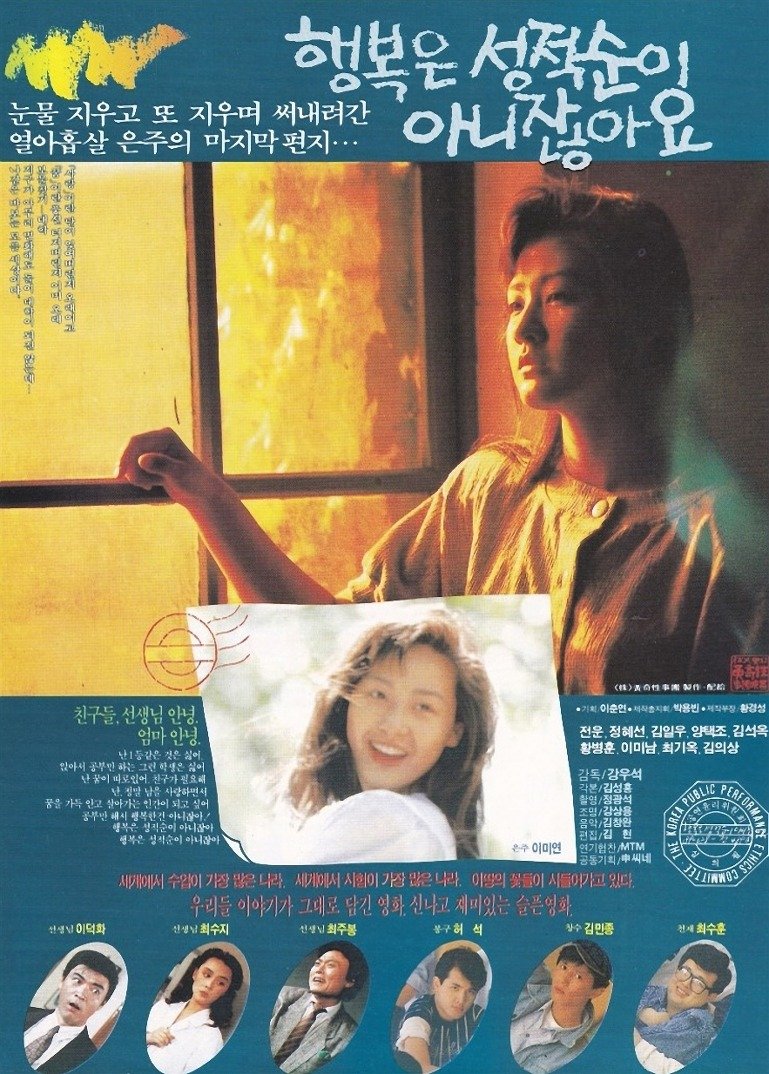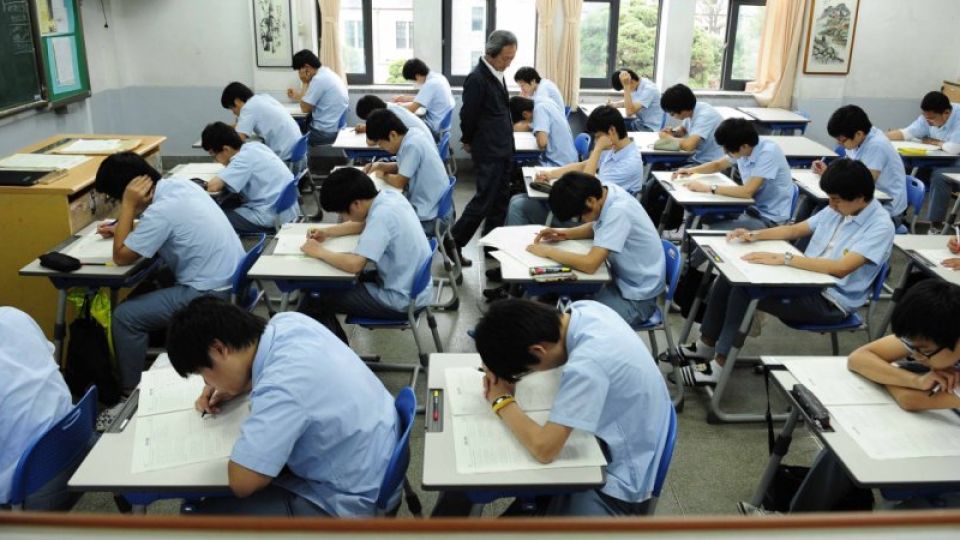July 3, 2023
SEOUL – “Happiness Does Not Come in Grades.”
This is the title of a Korean teen movie released in the summer of 1989. The film went on to become the third highest-grossing film of that year.
Just like any typical teen movie, the film weaves together a budding romance, friendships and the trials of school life. Set in Korea in the 1980s, the film ends in tragedy — the lead character, played by then-17-year-old Lee Mi-yeon, kills herself under immense pressure for academic excellence.
The film’s title, which continues to resonate with students to this day, derives from the last words of the teenage girl.

Poster of the 1989 film “Happiness Does Not Come in Grades”
Despite the movie’s message, life imitated art later that year when two high school students died by suicide amid the pressure of the approaching college entrance exam, as reported by The Korea Herald on Nov. 7, 1989.
The single-column article tells a harrowing story of how one of the two, a 19-year-old boy, jumped to his death while his mother pleaded him not to. The other student, a 17-year-old girl, was described as showing signs of having a nervous breakdown, before she was found dead.
Both incidents occurred within a few blocks of each other in the Eunma Apartment complex in Daechi-dong, a district in Seoul’s Gangnam-gu famous for private academies and cram schools.
Sadly, the double tragedy at the Daechi-dong apartment was just one among many teen suicides that occurred throughout the year. And, as the competition for elite schools reached perilous levels in a country obsessed with education, many more would follow.

The Nov. 7, 1989 edition of the Korea Herald
Grades claim lives
Education Ministry data from 2022 shows that a total of 630 elementary, middle and high school students died by suicide between 2018 and 2021. In 116 of the deaths, academic pressure was cited as the main reason. Grades caused more deaths by suicide than sexual violence, personal relationship troubles, financial issues and other reasons.
The ministry’s 2022 white paper on suicide preventions shows that students with lower grades were more likely to consider suicide, and that such tendencies were more profound in girls. Among female high school students, 13.3 percent with high grades reported having suicidal thoughts, while the figure was 13.5 percent for those with mid-level grades and 23.5 percent for those with low grades.
In July 2022, local civic group World Without Worries About Private Education conducted a survey on 7,035 students across the country and found that 25.9 percent of the respondents had contemplated hurting or even killing themselves. Over half said that grades were the main source of stress. The rate of those who had considered self-harm or suicide was higher among older students: 63 percent among high school seniors, 50.4 percent middle school seniors and 27.4 percent among sixth graders.
“Korea needs a state committee to discuss how to alleviate students’ pain (stemming) from an overly competitive education system and find reasonable solutions for this problem,” the civic group stressed.
Reform after reform, but deaths continue
South Korea’s education authorities have tried to take steps to fix the problem.
One of their many efforts was the College Scholastic Ability Test or the Suneung.
Introduced in 1994, it was a standardized test modeled after the United States’ SAT and aimed to test students’ logical thinking and problem solving abilities, rather than their rote memorization skills. Authorities sought to reduce the burden of preparation by reducing the number of subjects included in the annual test.
Nearly three decades after the introduction, however, the Suneung finds itself in a tough spot.
Earlier this month, President Yoon Suk Yeol issued strong words of criticism toward the test, particularly in regard to the so-called “killer questions” characterized by their high level of difficulty. He said the Suneung should not test students on materials that do not appear in school textbooks, saying those questions are “just messing with children.”
Following Yoon’s comment, the Education Ministry rolled out a series of reforms that include an additional oversight of Suneung questions by a panel of teachers, free online lectures and college admission counseling for students.
Ministry officials hope that the measures will curb the country’s escalating private education expenses, which, according to Statics Korea, accounted for a larger proportion of spending than food for both high-income and average-income households in 2022.
Assessment of governmental reform notwithstanding, several education experts say that the Suneung requires some adjustment.
Park Do-su, professor emeritus at Korea University and one of the founders of the state-administered test, said in a recent interview with local media that the Suneung was never intended as a test that ultimately determines which college one could go to.
“Suneung was designed so that it would be used as one of the various tools that colleges could use to evaluate students,” he said, saying its original intent was to assess the linguistic and thinking abilities of college applicants.
Despite the series of education reforms that took place since the 1990s, the problems with the college admission system persist, with both political circles and civic society searching for answers.
World Without Worries About Private Education filed a joint petition with 93 lawyers to the Constitutional Court arguing that the current college admission system is unconstitutional since it forces students into extreme competition that infringes upon their dignity, rights to pursue happiness and their right to life.
Rep. Kang Deuk-gu of the main opposition Democratic Party last month proposed a bill that would ban curved grading systems in college admissions, saying that it leads to unreasonable competition among students.
While the exact path remains unclear, consensus across the country is that something needs to be done about the current college admission system in order to stop the pressure on students from getting out of hand.
In 2019, exactly 30 years after the two teens died at the Eunma Apartment complex, a 19-year-old jumped to his death after taking the Suneung.
“For too long, our country has permitted a ‘war-like’ competition-based education system that students go through to enter prestigious universities. It is time for the adults, and the nation, to look into the sense of shame and guilt students experience (from not getting good grades), and into the system and the culture we have made,” Rep. Kang said.
If you’re thinking about self-harm or suicide, contact the Ministry of Health and Welfare’s helpline 1393, available 24 hours a day, 7 days a week. Please request a translator for English-language services.


